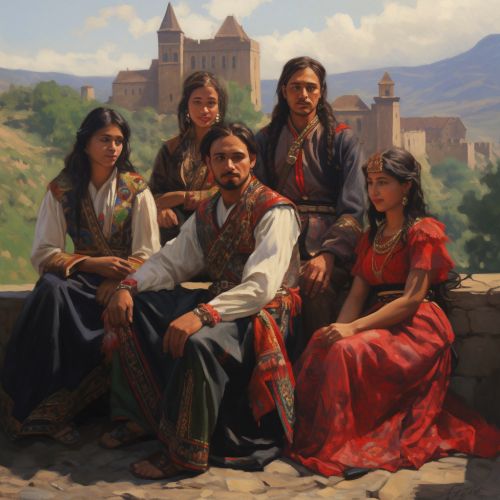Romani people
Origins and History
The Romani people, also known as Roma, are an Indo-Aryan ethnic group, traditionally nomadic, with origins in the northern regions of the Indian subcontinent. The Romani are widely dispersed, with their largest concentrated populations in Europe, especially Central, Eastern, and Southern Europe.


The exact origins of the Romani people are subject to debate among historians and linguists. However, linguistic and genetic evidence indicates that the Romani originated from the Indian subcontinent, migrating to the Middle East, and then to Europe around the 11th century. The reasons for their migration are unknown, but it is speculated that it may have been due to invasions, religious persecution, or economic conditions in their homeland.
Culture and Society
Romani culture is diverse, with numerous subgroups and varying traditions. Despite their dispersion, the Romani have maintained a strong sense of community and cultural identity, often characterized by a common language, Romani, and a nomadic lifestyle.
Romani society is traditionally patriarchal, with families often arranged in extended kinship networks. The Romani have a rich oral tradition, with an emphasis on family lore and storytelling. Music and dance also play a significant role in Romani culture, with styles varying greatly from region to region.
Language
The Romani language, known as Romani chib, belongs to the Indo-Aryan branch of the Indo-European languages. It is spoken by the Romani people throughout the world, with dialects varying greatly between different Romani communities. Despite the widespread use of Romani, it is not officially recognized in many countries, leading to concerns about its preservation.
Discrimination and Persecution
Throughout history, the Romani people have faced significant discrimination and persecution. In many countries, they have been marginalized, stereotyped, and subjected to systemic racism. This has resulted in socio-economic disadvantages, with many Romani living in poverty and facing barriers to education, employment, and healthcare.
During the Nazi Holocaust, the Romani were targeted alongside Jews and other minority groups, in what is known as the Porajmos, or the Romani Genocide. It is estimated that between 200,000 and 500,000 Romani people were killed during this period.
Contemporary Issues
Today, the Romani people continue to face challenges, including discrimination, poverty, and lack of access to education and healthcare. However, there are also efforts to improve the situation of the Romani, with initiatives aimed at promoting their rights, preserving their culture and language, and improving their socio-economic status.
